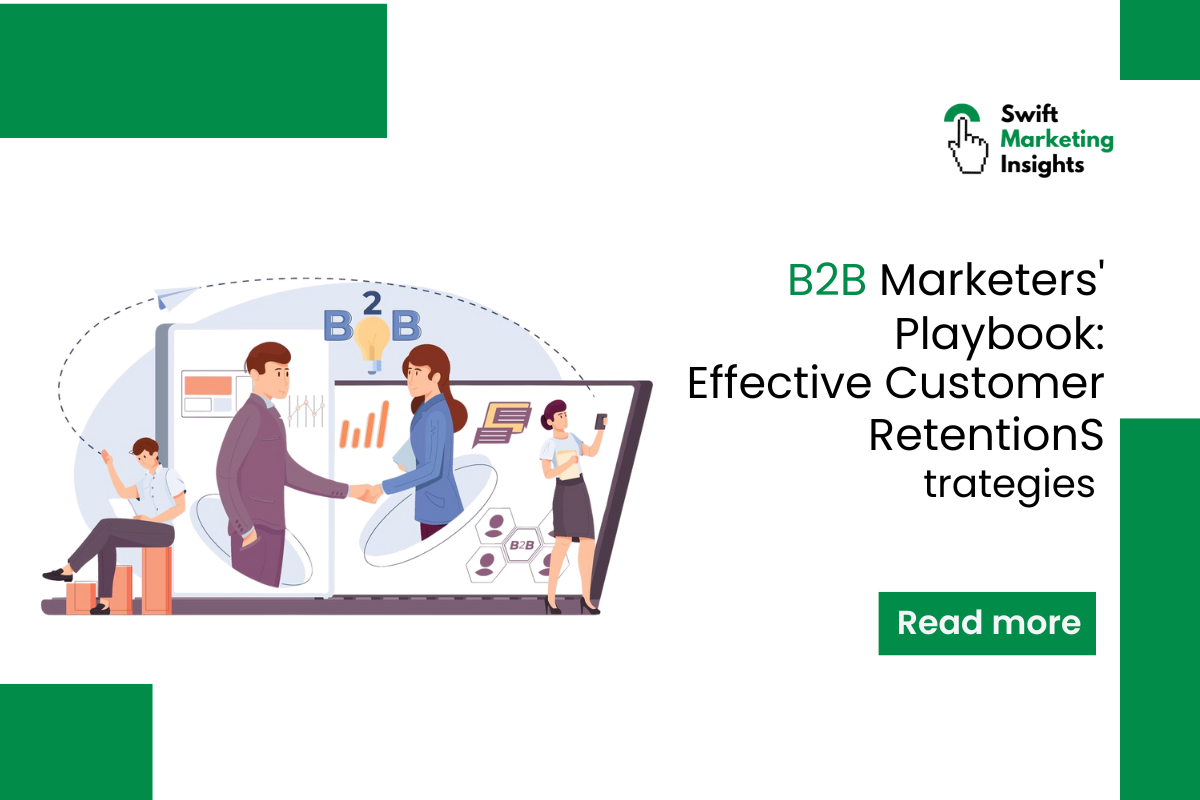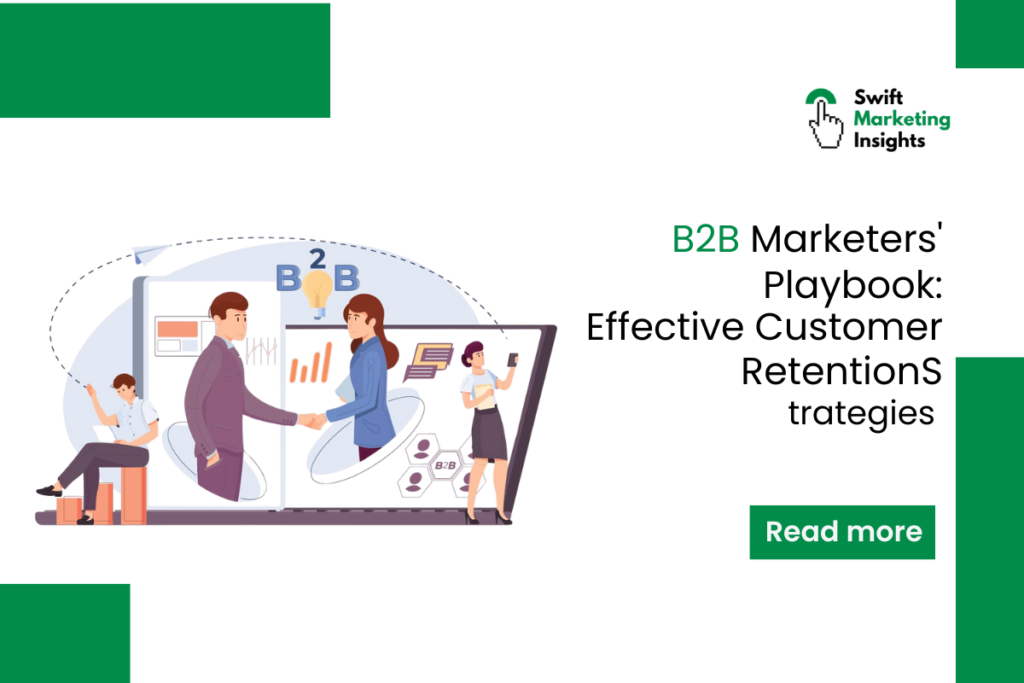

The fast-paced B2B marketing landscape necessitates a more than just customer acquisition strategy for the goal of business growth. Acquiring customers is indeed indispensable, however, it is equally, if not more important, to keep the existing clients. According to a study by Bain & Company, a 5% increase in customer retention can lead to a 25-95% increase in profits. This reinforces the importance of customer retention in B2B marketing and the urgency for marketers to create relevant methods to keep the clients interested and loyal.
The B2B marketers’ playbook is a hands-on manual we will explore throughout this article. We will be covering the top customer retention strategies that can help you develop long-lasting customer relationships, drive customer success, and in the end, fuel business growth.
Understanding B2B Customer Retention
Customer retention is a B2B business ability to build a bond that is strong and lasting with its existing clients, which is meant to let the clients stay upbeat, contented, and devoted around the company. In contrast, most B2C marketing strategies aim to focus on individual customers. In addition, the B2B customer retention fosters continued relationships with the decision-makers and other stakeholders in the client organizations.
In the B2B marketing context, companies can gain a range of advantages by focusing on their customer retention. Primordially, retaining current customers is more cost-effective than acquiring new ones because a lot of money is saved. The Harvard Business Review claims that attracting new customers may be five to twenty-five times more expensive than keeping the existing ones. Moreover, retained customers are usually regarded as crucial assets as they increase the lifetime value of the business by readily buying upgrades, taking more services, and bringing new customers to you the firm.
Nevertheless, B2B customer retention is a challenge, and for that you must be ready for it and take a chance on it. B2B relationships are mostly intricate, and they involve multi contact points. On the other hand, B2B clients are also hard to retain as their needs and expectations keep changing, thus necessitating marketers to be more flexible to enable them to adapt to the changes without much struggle.
Key Strategies for B2B Customer Retention
Let’s look at some key strategies that help businesses in customer retention.
A. B2B Account Management Best Practices
Effective business-to-business account management lies at the heart of successful customer retention. Through establishing strategic and long-term relationships with the key accounts, marketers can guarantee customer satisfaction, and create new growth opportunities, and may also strive to resolve any challenges well before their occurrence.
To excel in B2B account management, consider the following practices:
- A well-trained team of employees is a great start, but it is necessary to also hire dedicated account managers who will always be in contact with the clients and able to offer tailored advice.
- Cultivate sound business acumen for your customers by extensive study of their business, industry, and rivalry around the marketplace.
- Establish a robust comprehension of your clients’ companies, sectors, and routings to bring progress to their business processes and render them useful guidance.
- Be open and transparent and that requires the listening of the client responses and timely response on given issues.
B. Customer Loyalty Programs for B2B
While the loyalty programs are to prevent B2C marketing, they can also be equally useful in the B2B segment. Repeat customer purchases and strengthening of customer relationships are one of the major B2B loyalty programs benefits. Thus, loyalty programs can be particularly useful for B2B organizations.
Some examples of B2B loyalty programs include
- Incentive strategies include tiered loyalty programs with greater rewards and privileges for the client as the amount of spending and engagement increase.
- The inclusion of point-based scenarios is an efficient option for the client; the customers can either accumulate points from the purchase or specific actions which can be converted into subscriptions, exclusive services, or other rewards.
- VIP programs are the mechanism implemented which involve premium benefits, may it be priority client support, exclusive events, customized solutions to high-valued clients.
A B2B target market loyalty program was proven successful by Hewlett Packard (HP)’s Partner First plan where channel partner engagement and performance are rewarded with sales, training participation, and customer satisfaction scores. This program has contributed to partners’ relations of HP and the corporation’s business ownership drive.
C. B2B Customer Engagement Tactics
Encompassing B2B customers at every stage of their journey is key to keeping them and establishing relations for years ahead. By providing valuable B2B content, personalized experiences, and opportunities for interaction, marketers can keep clients engaged and invested in the partnership.
Effective B2B customer engagement tactics include:
- It is imperative to produce confidential literature, including sophisticated insights, case studies, and leadership papers that are relevant to clients’ particular needs and interests.
- Holding of dedicated events, webinars, or workshops whereby clients are offered experiences that provide opportunities to learn and interact with your brand.
- The social media platforms and online communities may be tapped for customer discussions, update sharing, and community building, which would provide clients with shared online platform.
- Responding to customer feedback continuously relating it to product development, service improvement and general business strategy.
D. Personalized B2B Customer Experiences
In the world where B2B relations have become more competitive, the customized customer experience has now become not a kind of luxury but a necessity. Through personalizing the services provided, challenges faced and communicating information to the clients depending on these clients’ needs and preferences, a marketer can build the identity of the brand that will end up with devoted customers.
To deliver personalized B2B customer experiences at scale, consider the following strategies:
- Use collected data and analysis tools to get a detailed understanding of customers present in the company, their behavior, preferences, and pain points.
- Make use of marketing automation tract to help engage in sending target content, offers, and recommendations based on prospect profile and viewing history.
- Enable the account managers, customer success teams, and the entire sales team to offer tailored support and solutions specific for each client such as his immediate needs and long-term goals.
Salesforce has been a role model by way of Success Cloud which offers a range of personalized services which include resource, support, and guidance. With the offering of individual success plans and constant reminders, Salesforce not only enables clients to reach their goals but also to benefit from the best that it has to offer.
Optimizing B2B Customer Feedback Strategies
The feedback from the customers is a mining rich in data that can be useful to a B2B marketer to know the demands of clients, spot areas of shortcoming, and enable client success. Through curiously being customer-focused by paying attention and acting based on customer response, marketers show their willingness to create lasting bond with the clients.
To optimize your B2B customer feedback strategies, consider the following tips:
- Provide several types of customer response channels, for example, surveys, interviews, and customers’ communication committees to detect the full range of customer attitudes.
- Offer a detailed customer feedback analysis to reveal prevailing tendencies, hassles, and viable solutions.
- Use the feedback loop to communicate with clients how their input has already been applied and if any results or changes are seen; this will express the value of their feedback.
- Employ the capability of managers to react and respond immediately to complaints and customer concerns while also revealing chances that grab those opportunities to better customer experience.
Customer Success in B2B
Customer success is a proactive method to ensure that customers can reach their goals and enjoy the best result from the invested capital for which they have purchased your offered products or service. An adoption of a customer success mindset and effective strategies for implementation allow the business-to-business marketers to keep the customers and, thus, expand their sales opportunities and quality of advocacy.
To build a customer success-focused organization, consider the following best practices:
- Constant alignment of your team about the comprehensive precise definition and interpretation of the customer success.
- Set specific metrics and KPIs so you will be able to evaluate and monitor the real client results.
- Create a full-fledge onboarding and education system that will allow customers to be able to quantify the value they are getting from your offered provisions.
- Preventively monitor client wellness and connection and timely deal with any emergencies and adverse risks by undertaking proper screening measures.
- Keep evolving your customer success models based on the target client opinions and efficiency data.
A customer-driven approach has been what makes businesses distinctive and highly successful, allowing them to build an involved and committed customer base that works for the future growth of the business.
B2B Marketers’ Playbook: The Customer Retention Blueprint
In the volatile and competitive business to business market, consumer retention is, absolutely, a key factor in business profitability. Through implementing the 10 undermentioned strategies stated in this playbook, the B2B marketers can, as a result, build strong, strong, and lasting relationships with the clients, drive customer success, and fuel business growth.
Going beyond your regular account management best practices and implementing rewarding schemes for clients, along with delivering highest possible level of personalization, the secret of B2B customer retention is to aim client satisfaction in all phases of marketing. With regular retooling of your strategies to meet customer expectations and market factors, you can elevate your business as a faithful business partner in the long run.
In an effort to be the one who gets the news first, and that which brings exclusive insights, expert tips, and industry secrets older lies, subscribe to our newsletter now. Our B2B marketing specialists have years of experience in handling retention issues and the marketing strategies they implement will deliver the results.






